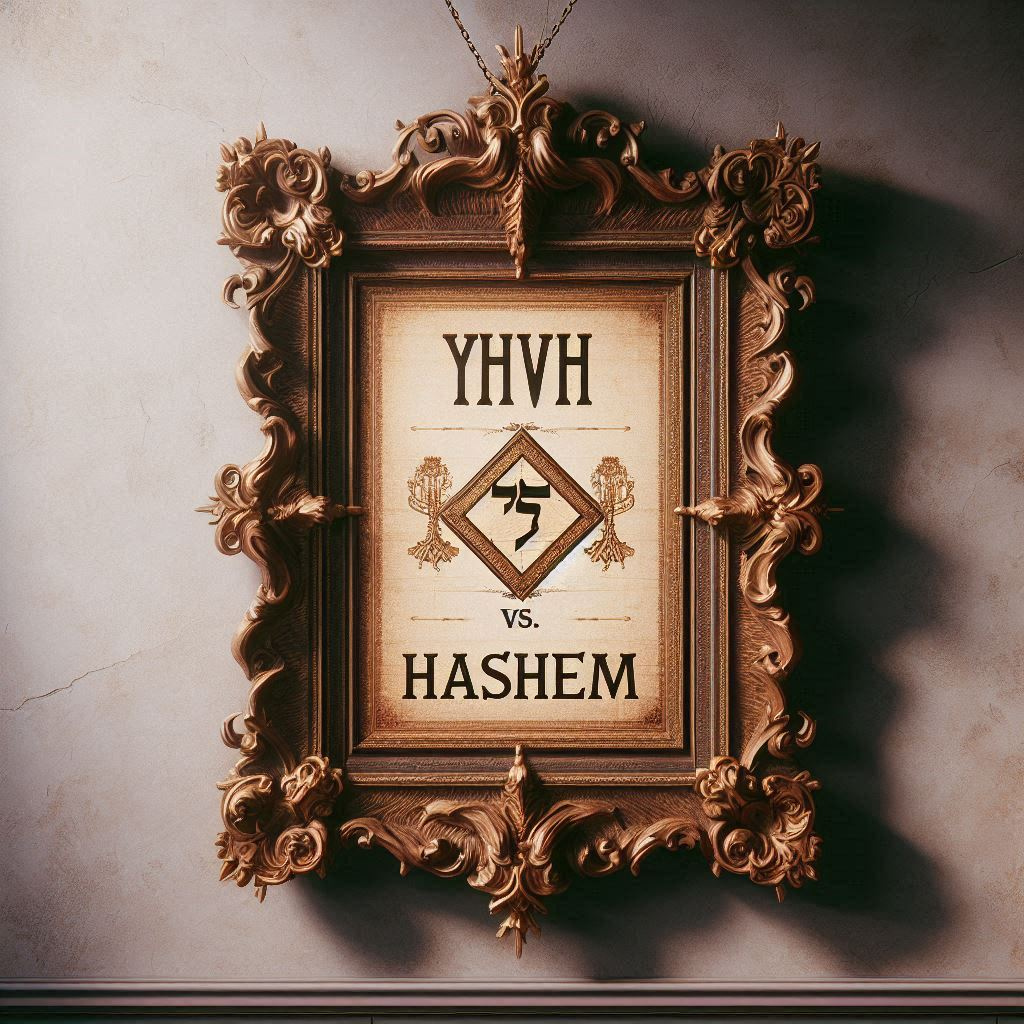The Ineffable Name Controversy: Breaking Traditions and Unveiling Truth
Introduction: In the realm of faith, the Name of Yehovah holds profound significance. However, the tradition of not uttering or writing this sacred name has sparked controversy and debate. This blog post delves into the origins, interpretations, and implications of this practice, shedding light on the true essence of the Ineffable Name.
The Tradition of Writing “G-d”: Many Jewish communities avoid writing the full name of God, opting for “G-d” instead. This practice stems from a passage in Deuteronomy, which commands the Israelites to destroy the names of non-Israelite gods. Rabbinic interpretations extended this to mean that God’s name should not be erased, leading to the tradition of writing “G-d”1.
Rabbinic Interpretations and Misinterpretations: Rabbinic authorities, such as Rashi, interpreted the prohibition against erasing God’s name as a reason to avoid writing it altogether. This led to the practice of storing or burying Jewish literature containing the name “God” once it fell into disrepair2. However, this interpretation has been contested, as the original scriptural intent was to prevent the worship of Yehovah in the manner of pagan gods3.
The True Name of Yehovah: The Father revealed His eternal and holy name to Moses, declaring it to be remembered for all generations (Exodus 3:15). Despite this, Rabbinic authorities replaced the name Yehovah with titles and descriptors like “Adonai” and “Elohim,” effectively nullifying the Torah’s instructions regarding the use of God’s name4.
The Impact of Rabbinic Regulations: By enacting regulations against using God’s name, Rabbinic authorities transgressed Yah’s eternal Torah. This has led to a widespread practice of substituting God’s name with titles, which often have pagan origins5. This practice contradicts the scriptural mandate to declare and magnify Yehovah’s name throughout the earth6.
Conclusion: As Torah-observant disciples, it is our duty to honor and proclaim the true name of Yehovah. By doing so, we fulfill the scriptural command to declare His name to all generations. Let us break free from traditions that obscure the true essence of God’s name and embrace the profound significance of Yehovah.
For those of you who would like to explore this week’s Torah Reading 13, I invite you to read and listen to the discussion entitled “Yehovah: the God Who Sees.” (Yehovah-The God Who Sees-STAR 13)
Remaining Set-Apart in the Midst of this Evil and Adulterous Generation-Rebooting my Thoughts and Reflections of Torah Reading 90
Shabbat Shalom Greetings beloved, on this glorious set-apart day from the DFW. My sincerest hope, trust, and prayer is that this reboot of Torah Reading 90 will be a tremendous blessing to you in these troublesome times were living. This Week's Reading as a Reboot...
Conforming to God’s Ways in the Midst of Present Day Wokeness: Thoughts and Reflections on Torah Reading 89
Greetings from the DFW on this warm but glorious Shabbat. We commenced the 4th month of Yah's sacred calendar year earlier this week, and we're trusting in His keeping mercies as we progress throughout the month. These are my thoughts and reflections on the 89th...
Oh the Blood of Yeshua-Thoughts and Reflections on Torah Reading 88
Greetings, Beloved of the Most High, on this warm but glorious Sabbath in the DFW. I pray that you, your families, and your fellowships are well and blessed. This is the 88th parashah or reading of the 3-year reading cycle. It is contained in Leviticus/Vayiqra...
Only One Way to God-Thoughts and Reflections on Torah Reading 87
This week's reading comes under the General Torah Reading Title of "Acharey Mos," which covers chapters 16 through 28 in the Cepher of Leviticus/Vayiqra. Shabbat Shalom on this warm but otherwise beautiful Sabbath in the DFW. Our reading here today is contained within...
Dwelling in the Presence of God Through Physical and Spiritual Cleanness-Thoughts and Reflections on Torah Reading 86
Shabbat Shalom from the DFW on this, what promises to be a warm but beautiful Sabbath. What follows are my thoughts and reflections on this week's Torah Reading, which is the 86th reading of the 3-year Torah Reading cycle. Our portion is found in...
The Leprosy-Sin Connection-Thoughts and Reflections on Torah Reading 84
Shabbat Shalom. I pray that this post finds you and your families and fellowships well and blessed on this holy weekend. This is the Leprosy-Sin Connection. It is my thoughts and reflections on the 84th Torah Reading of our 3-year Torah Reading Cycle....
Torah Reading 81–The Ordination of Aaron and Sons–First Steps to Humanity’s Reconciliation
Shalom! I pray that you had a meaningful and blessed Sabbath. What follows are my thoughts and reflections on Torah Reading 81 of our 3-year Torah Reading Cycle on this mild, but peaceful Sabbath in North Texas. Parashah 81 Leviticus 8:1-36--The Ordination of Aharon...
Thoughts and Reflections on Torah Reading 80
Shalom! We pray that you had a restful and meaningful Sabbath this past week. This past Sabbath’s Torah Portion was the 81st parshah of the 3-year Torah Reading Cycle. (If you are so led to participate in reading and studying the weekly Torah Readings, we have put the...
Biblical Rosh Hashanah 2023 and a TMTO Ministry Update
Greetings Saints! May this post find you, your families, and your fellowships well and blessed during these challenging times. I wanted to update you as to what's going on with The Messianic Torah Observer of late, as well as I wanted to encourage you as we enter the...
Shabbat HaChodesh-The Realities of The Sabbath Before the Biblical New Year in 2023
Welcome to Shabbat HaChodesh—The Sabbath Before the Biblical New Year of 2023 Jewish custom holds that the Shabbat that falls on or before the 1st of Aviv is Shabbat HaChodesh--or the Sabbath of the New Moon. Like its two preceding Sabbaths of Shabbat Zachor and...

